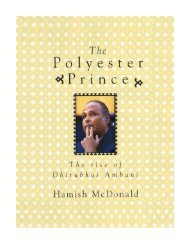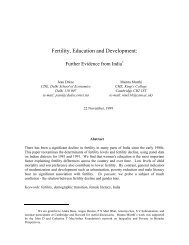You also want an ePaper? Increase the reach of your titles
YUMPU automatically turns print PDFs into web optimized ePapers that Google loves.
knew nothing about them, but was sent to West Germany and Japan later for formal<br />
training. He stayed with Reliance until retirement in 1993. ‘<strong>The</strong> years passed before<br />
we knew it, we were so busy,’ Patel recalled.<br />
<strong>The</strong> result was steady growth in sales and profits for Reliance. In 1967, the first full<br />
year of production at Naroda, the company recorded sales of Rs 9 million in 1967,<br />
yielding a net profit of Rs 1.3 million. Dhirubhai and his family shareholders refused<br />
to take dividends and kept ploughing earnings back into more machines. After a<br />
decade of manufacturing, in 1977 Reliance had a turnover of Rs 680 million, and<br />
profits of Rs 105 million.<br />
In an extensive write-up on the company in August 1979, the Indian Textile Journal<br />
reported on a massive factory at Naroda occupying 230 000 square metres and<br />
employing 5000 staff. It had banks of machines for texturising or primping artificial<br />
fibres to give particular sheens, machines for twisting the polyester and nylon fibres<br />
into yarns, and machines for weaving the yarns into textiles. <strong>The</strong> yarns were sold to<br />
other Indian textile manufacturers, or used in-house.<br />
Most significantly perhaps, Dhirubhai established his own brand name, Vimal (named<br />
after a son of his brother Ramnik), by dint of lavish advertising under the slogan<br />
‘Only Vimal’. This somewhat snobbish slogan, and some well-publicised fashion<br />
shows in top-class hotels, added a touch of class to a product that basically appealed<br />
to the less wealthy market sectors. In addition, Dhirubhai had got around the<br />
reluctance of established wholesalers and shopkeepers to accept a new brand by<br />
creating his own network of shops. Across India, some 400 shops were franchised to<br />
sell the Vimal brand of polyester materials for saris, shirts, suits and dresses.<br />
In one of the first of many eulogies to appear in the Indian press, the Textile Journal<br />
noted how Dhirubhai was held in high esteem by his staff, who attributed Vimal’s<br />
success to his dynamic leadership. ‘<strong>The</strong>n the construction of the factory was going<br />
on, it is reported, many snakes were seen in the area. According to a popular belief,<br />
appearance of snakes is a good omen. Dame Luck certainly seems to have favoured<br />
Mr. Ambani. Ever since the emergence of Vimal, he has developed the Midas touch.<br />
Everything he touches becomes gold. Everything he starts blossoms into success.<br />
Naturally, nothing succeeds like success.’




